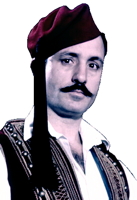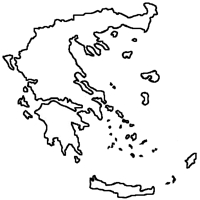
|
The Society of Folk Dance Historians (SFDH)
Teaching Greek Folk Dances
[
Home |
About |
Encyclopedia | CLICK AN IMAGE TO ENLARGE |

|
 In teaching Greek folk dances, the main elements to keep in mind are the forms of each dance phrase. However, to analyze and present this structure within its rhythmic content, we try to fit it into a musical or a melodic phrase.
In teaching Greek folk dances, the main elements to keep in mind are the forms of each dance phrase. However, to analyze and present this structure within its rhythmic content, we try to fit it into a musical or a melodic phrase.
In the folk forms, the relationship between the dance phrase and the melodic or musical phrase will vary because we are dealing with the "folk" (many people) who are not musically sophisticated or dance oriented. Only when the dancer becomes aware, and has musical and dance exposure, will he begin to order the dance phrase to the musical phrase, and appear more structured. When this happens, the folk form is not free or loose and the element of "improvisation" will disappear. But by leaving the structure loose, we can encourage the lay person, and students, and even recreationally-minded persons to observe "improvisation." They would be more apt to do so, and hus follow the true spirit of the Greek folk dance.
Thus, though the dancer is adhering to the rhythm, and is aware of the form, he will improvise within this concept, for greater pleasure, for creativity, and for better rhythmical understanding.
The ritualistic elements surface and the intent of the Greek folk dance is served in making it viable, and a provoking experience for anyone wishing to participate in Greek dance. This will definitely prove that it is not restricted to ethnic Greeks, but is openly available to everyone.
Used with permission of the author.
This page © 2018 by Ron Houston.
Please do not copy any part of this page without including this copyright notice.
Please do not copy small portions out of context.
Please do not copy large portions without permission from Ron Houston.